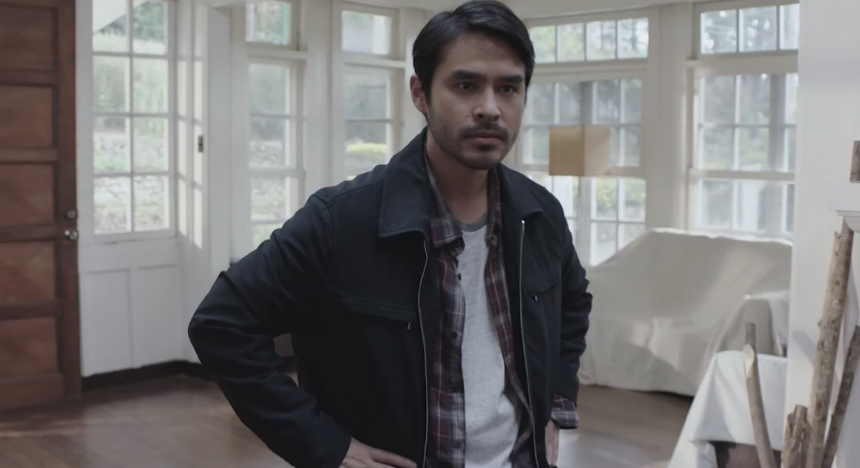Review: CITIZEN JAKE, A Wake-up Call for Both the Sleeping and the Woke
Mike de Leon directed a film that doesn’t shy away from serving as a reality check.

Often a trope in movies is when a hermitic, wise -- and often cranky -- veteran is brought out of retirement to school the youth when the times have turned most trying, especially when the villains they once faced in the past have re-emerged from the ether.
Obi-Wan did it with Luke, as Luke did for Rey. So did Agent K for J, as well as Toph for Korra. Keeping the light alive; bridging the past, present, and future.
Well, art imitates life, life imitates art, and we may have just found ourselves gobsmacked in the middle of our generation’s great battle, that tipping point where our world has fallen wayside enough to warrant the sages of the past to re-awaken and take their place once more at the forefront of the battle.
In this instance, it is director Mike de Leon that has rejoined the fray and his weapon of choice is Citizen Jake.
For the screening I attended, the opening remarks made it a point to specify that Citizen Jake IS a tale of privilege. Accurate enough, rather than it being a story of journalistic fortitude, it uses journalism merely as the foundation for its provocative message of introspection.
Privilege in the film takes the form of the titular Jake (Atom Araullo), a citizen journalist cum college professor who is the son of a former Marcos crony now turned senator. Throughout the film, as much as Jake tries to distance himself from the sins of his father, he is also shown to benefit significantly from his familial connections. His career banks on the power of his name, his whistleblowing only possible through the access his privilege affords.
Furthermore, there’s this sense of farsightedness in Jake’s crusade to battle the Marcos legacy and its byproducts. Coming from the ivory tower of his, his focus is set on toppling nationwide corruption piecemeal. But when confronted with the case of a murdered girl from the university he teaches at, there’s a disdain that comes from Jake — contempt that the case is too small for the caliber of his fight.
Through such nuances, Citizen Jake forces us to look inward. It targets the upper to middle class woke millennials of today. We as a generation wear our politics on our sleeves, but do we practice true empathy? Or are we walking contradictions such as Jake?
Citizen Jake doesn’t shy away from its being a reality check. It explicitly proclaims its intentions by directly addressing the audience through its form that blends documentary, traditional narrative, and metafiction.
Jake talks to the audience, telling us about the truths this film possesses being stranger than its fictitious narrative. He gives us behind-the-scenes commentary between shots, e.g., which certain characters such as Jonie the ponyboy (Luis Alandy) is based on, the sordid history of the film’s setting Baguio, and so forth.
By shedding as much artifice in the film as possible, Mike de Leon grounds Citizen Jake as close to reality as he can get. He blurs the line between real and reel. He even goes to the extent of boldly calling out real-world politicians, euphemisms and genialities thrown out the window.
(Taking a cue from 50 Cent, de Leon pulls out a laundry list of barbs: insulting Imee Marcos as vomit-inducing, jabbing boxer-senator Pacquiao, attaching the names of Senator Revilla and Estrada to a joke about high-class escorts, among others.)
It is these provocatives that form the core of Citizen Jake.
Occupying the periphery, Citizen Jake positions its plot as merely the device in which the parables that concretize the film’s activism can be tied together. They house the pent-up rage and frustration that has been possibly bubbling inside de Leon as a weary observer all these years.
Because it carries these hefty number of sentiments (as well as, in my theory, the smaller conspiracies/urban legends that have turned into hushed whispers from the underbelly of Manila [e.g., student escorts, Maria Theresa Carlson, socialite-controlled brothels]), it is not surprising that Citizen Jake’s story can get a bit convoluted and contrived, particularly by the end.
Still admirable though is the skill de Leon showcases in stringing these disparate stories cohesively enough to still serve as mirror our country can reflect upon. It questions that silence that has turned these little anecdotes we’re familiar with (we’ve all heard versions of them one way or another) and asks us why like Jake, we have to be forced to care about them, why we take them so matter-of-factly.
In the end, Citizen Jake posits that our fight should never be selective nor myopic. Corruption and oppression are like The Mind Flayer from Stranger Things season 2 to which everything is connected to.
We cannot kill the beast by just chopping one of its arms. For those stuck in apathetic slumber, it is time to wake up. For those who are awake but have eyes set in the distance, look down, look down around, for evil encroaches and surrounds.
(Cross-published in Film Police Reviews.)







